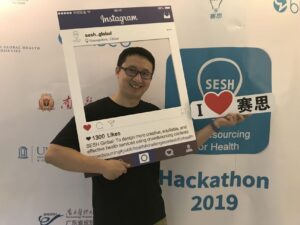Weiming Tang, PhD, promotes social innovations in health, using crowdsourcing that inspires the creation of equitable and effective health services, as well as pay-it-forward approaches that show how kindness can be contagious in healthcare. As co-director of Project China, Weiming has co-authored over 200 peer-reviewed publications. And when it comes to success, he says “patience” is key—from his research that builds, step-by-step, to the parenting of his two kids who are learning English. He also has a hobby that requires “patience,” and he enjoys the rewards.

1.) How did you choose infectious diseases?
My interest in infectious diseases started when was I was an undergraduate student at Nanjing Medical University in China, volunteering to promote sexual health among college students. I established the Red Ribbon Association for peer education to promote HIV education, and I started to receive lots of funding for this work. I was soon selected as one of the top 10 students in China, and eventually this became my career. After graduating from Nanjing Medical University with my master’s degree, I was doing HIV research and decided to apply to the epidemiology program at UCLA. There, I met Roger Detels, MD, MS, an epidemiologist who has spent his whole life researching HIV infection in Southeast Asia and China. He became my mentor.
2.) How did you arrive at UNC?
I started to look for postdoctoral positions as I was graduating from UCLA, in March 2014. I knew Joe Tucker, MD, PhD, who was working with UNC Project-China at Southern Medical University, established in 2012. He suggested I join him and move back to Guangzhou to help advance the project.
3.) Where are you from in China?
I grew up in the Jiangsu Province which is close to Shanghai, and one of the richest provinces in China. I majored in preventive medicine at Nanjing, which is similar to a public health degree. Altogether, I attended Nanjing for eight years which prepared me for the PhD program in HIV/STD Epidemiology.
4.) What do you find most rewarding about your work?
We use interventions to bring changes in behavior that can improve health, and we are developing intervention tools for communities. This is definitely rewarding because our research strategies are now being used by global colleagues, who are adapting them for local policies, for behavior change. The SESH (Social Entrepreneurship to Spur Health) initiative is a partnership joining individuals from the Southern Medical University Dermatology Hospital, London School of Hygiene and Tropical Medicine and the UNC-Project China. We are developing creative, equitable, and effective health services that use crowdsourcing open calls and other social entrepreneurship tools.
5.) What is the pay-it-forward approach?
The pay-it-forward strategy offers an individual a gift, such as a test for sexually transmitted diseases, and then asks whether they would like to give a gift, a future test, to another person. We didn’t know if this would work but the pilot study showed that it was really useful and interesting to many people. Our first study examined the effectiveness of pay-it-forward (PIF) to increase gonorrhea and chlamydia testing among MSM (men who have sex with men) and saw a 54% increase in testing for sexually transmitted infections among MSM when the PIF approach was used, compared to 6% in the control group. Then we moved the game to other populations, including female sex workers to promote HIV testing, STI testing, and HPV. Now, we’re testing how to promote influenza vaccine uptake, as well as HPV vaccine uptake among adolescents.
6.) How has your work been recognized globally?
What we’re doing is still new to the vast majority of people. In 2018, our work was selected as one of 10 finalists in the World Health Summit’s Startup Track, for the best ideas to promote health. And in 2020, our work received the World Health Organization’s “Reboot Health and Well-being Award.” Through SESH and the Social Innovation in Health Initiative, we also developed a practical guide for crowdsourcing in health, with the World Health Organization.
7.) What’s the most important advice you’ve ever received?
This advice probably comes more from my co-workers and how we work together. We have a team of about 20 people that includes nursing and management staff. It’s important to be “patient” and keep working hard in everything we’re doing. It’s also especially important as a mentor, in order to offer guidance and understand a student’s needs.
8.) Do you have hobbies?
I enjoy fishing. Sometimes I go to Jordan Lake, and sometimes I go to University Lake. I usually fish late at night, or early in the morning, before the kids are up. I like to catch the largemouth bass or crappies. Then, I cook them at home.
9.) What’s the last book you’ve read?
I’m currently reading Gone With the Wind by Margaret Mitchell. It’s a great story showing a period in history that changed over time. I don’t read many books in English, but I found this one and decided to read it because it’s famous. It has taken a lot of work and I’m almost done.
10.) What do you do you like about working with the Institute?
I like being able to work with people who have different backgrounds and who are working together to solve global problems. We are not competing. We are working in harmony. The Institute offers the best collaboration, and I really like this.
The Institute for Global Health & Infectious Diseases (IGHID) attracts people who are driven to make big change. From principal investigators and grant managers to regulatory specialists and study coordinators, everyone has an important role to play in what we do around the world. We are pleased to highlight colleagues who proudly serve IGHID.
